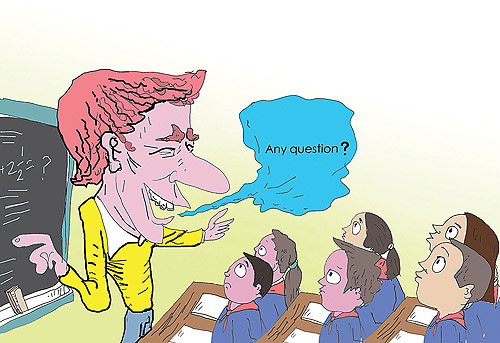|

As an educator, I have found that work and education have priority over personal happiness for my Chinese students, both in China and abroad. Chinese students work extremely hard, keeping a serious mien, while American students are often casual and joyful, and sometimes rather cavalier regarding their studies. This contrast in academic attitudes is deeper than differences in textbooks, curriculum and teaching methodology. The core cultural values of how people perceive themselves are at stake. Chinese view themselves as members who are connected naturally to an extended network; Americans see themselves as free-willed individuals striving for personal success.
This cultural divide is vast. Because of their grave faces, Chinese students, and consequently Chinese culture, often seem muted, passive and unemotional to foreign teachers and visitors. Indeed, in China, strong expressions of personal feelings have been discouraged by centuries of cultural norms stipulating behavior for the betterment of the group, not the individual. Confucian ethics are a prime example of this philosophy, teaching Chinese students to respect their elders, their teachers and their parents. When foreign teachers describe Chinese students as passive and unresponsive, I know that a cultural misunderstanding is taking place, rather than a lack of student discipline regarding assignments and homework. I tell my colleagues that, in China, directly responding to classroom questions is still considered bad manners, because it is rude to challenge anyone who has authority over you.
Following traditional Confucian cultural norms, the Chinese reduce their need for direct and emotional responses to problems. Students requiring assistance, as well as workers in companies will often employ an intermediary. And, in fact, the greater the reputation and status of the intermediary, the more likely the chances those appealing for something will succeed. Recently, a professor came to my office to appeal for a student, trying to help that person achieve a higher mark. My foreign colleagues were baffled and asked why the student did not come to me directly. They saw the incident as somehow unworthy. By Chinese standards, this wasn't a negative act, because the intermediary demonstrated the diverse but vital role of the group, showing how status and hierarchy functions in Chinese culture.
The personality of an individual and the culture of his society do not always match up perfectly. I hesitate in drawing broad generalizations about my own American culture, much less Chinese culture. However, I can say with relative impunity that Chinese and American homes reflect contrasting values and these values influence student behavior.
For example, Americans believe their children have rights from birth, and even in the womb. They cater to their kids; they're determined to do the very best for them. Americans spoil children and treat them as unique individuals with emotional, social and commercial needs. Unsurprisingly, American children often grow up thinking more of themselves than of their families and hometowns. The "Me Generation" aptly describes American students. Moreover, American children, although raised by adoring parents, often go through teenage rebellions, and parents, once their children's idols, can easily become adolescent enemies.
In contrast, Chinese students rarely revolt. They are still, for the most part, raised among an extended family, where mutual affection is discreet, and toned down between children and parents. Even with the one-child policy, I feel that Chinese children receive balanced affection because most children have opportunities to relate to their extended families. In this way, Chinese children also absorb security, knowing they have a definite place in the family hierarchy. Their duty is to revere and support their parents before all other obligations. This responsibility becomes grounded not just with the mother and father, but extends outward to kin, villagers and countrymen.
Instead of belonging to an isolated and emotionally intense American type of dyad—a mother and father—the Chinese child intuits that he belongs to a series of groups. As children grow up and go to school, this obligation is voiced by the adage to perform well in school. The Confucian dictum states that the parents and the teachers are always right, therefore children and students must humbly submit to authority. In this way, Chinese children learn to perceive the world as a vast network of relationships. Intermediaries are part of this web. In contrast, American children view themselves as unique individuals who must constantly has to strive alone, seeking security and validation by competing with siblings, peers and later coworkers.
Which cultural system is better? Love exists among family members for both Chinese and American families; they're just different. Chinese literature has many stories of filial piety between sons for fathers and students respecting teachers. Folktales recount children slicing off portions of their flesh to help ailing parents. In today's postmodern world, respect, loyalty and affection are needed around the world. We can learn much from our Chinese students.
The author is an American living in Beijing |
